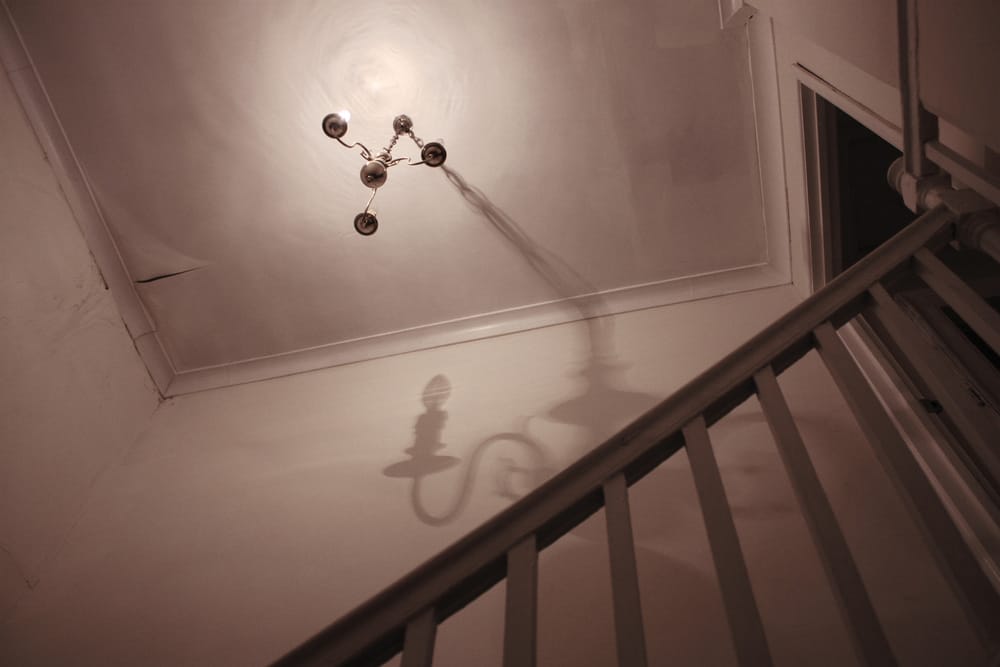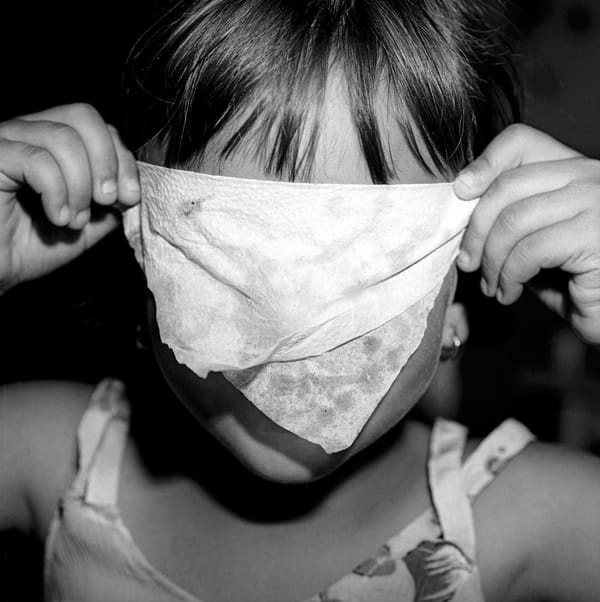Attack from Within

The sound of the radio was not loud enough to drown out the cries from upstairs. Sophie continued with her routine, putting the shopping away, unloading the dishes; making sure everything was in its rightful place. She paused, just briefly, to adjust the old radio, which seemed to be getting quieter and quieter these days. She still had the whole of the downstairs to vacuum before she could even start dinner and, with a small sigh, crossed into the dimly lit corridor towards the cupboard under the stairs. It took a while for her eyes to adjust to the dark, and while she was scrabbling to find the door handle, the abrasive noise from upstairs registered again. Realising she could no longer put off going to see her, and with no small measure of trepidation, she ascended the staircase and gently knocked on the door at the end of the landing.
“Can I come in?” muttered Sophie, not really wanting to be heard. A moment or two passed in silence before Sophie could gain the courage to enter. The room was even darker than downstairs; with only a faint corona of light penetrating past the thick curtains.
Quietly, she crossed the room towards the window and slowly drew open the curtains, just a small amount, to allow the now overcast day to filter through. Though the room brightened only a fraction, it was enough to disturb the hunched figure resting beneath the covers on the bed. The figure coiled tighter, and let out a quiet murmur of disapproval, or possibly pain.
Sophie felt annoyed and, although she instantly regretted the feeling, that small surge of adrenaline racing down her spine could not be subdued. It had been this way for almost a year now. She sat herself down at the end of the old, iron bed, which juddered noticeably as she did so. A hand was protruding out slightly from beneath the sheets. Sophie had an overwhelming urge to grab the hand, to shake it violently even, to do anything to get her to react. What use would it be really, she thought. She couldn’t change anything, and neither could the doctors.
Reaching out anyway, she delicately touched her mother’s hand, which was as icy cold as it always was. She hoped for even the smallest sign that her mother acknowledged her presence, but none came. Was the numbness getting worse, Sophie wondered, or was she retreating even more into her slowly crumbling shell.
"These radio waves were made of the same thing as light, so even in the darkest room one might be illuminated by the soft, comforting voice of a stranger"
There really wasn’t any point wondering about such matters again, seeing as she probably would never get the actual answer, not while her mother was in this condition. She had spent too much time sitting here anyway; she had more pressing things to do. Sophie collected the used plates and mugs from the bedside table, and slipped out of the room. As she closed the door behind her, she could hear her mother stirring once more. She had been going through another relapse for the past few weeks, and obviously, the pain was once again getting too much for her.
As she rushed down the dark staircase, hands laden with the remnants of yesterday’s meal, she somehow lost her footing – stumbling down the last three or four steps – collapsing on the floor at the bottom. How foolish she must look, Sophie thought, her school clothes covered in the half eaten stew she had prepared yesterday. Really, she was lucky not to have broken her neck, never mind the dishes, which had miraculously survived, although her ankle felt less than lucky. Sophie had seen her mother have similar falls many times over the years; it had been a normal occurrence, that is, until she had resigned herself to her bed. Sophie had no disease to blame for this accident, however, and no mother to console her. And so, with a determined grimace, she picked herself up, gathered the scattered debris and hobbled back into the kitchen.
Returning to the corridor to clean up the mess, she reached for the light switch – for now it was almost completely dark – and, as she flicked the switch, the light bulb above her head flickered violently for a second and then extinguished. The wiring in this old house was in tatters; every other day there was something short circuiting on Sophie, or at least it seemed that way.
The ceilings in their Victorian house were unusually high, and Sophie was quite short for her age. Normally, changing a light bulb would have been in the realms of dad-territory, just like mowing the lawn or accompanying mum to the hospital had been. Circumstances, however, have the frustrating ability to change on you with very little notice. Dad was no longer here and so, once again, the burden would have to fall on her. There were no spare bulbs in the house and she couldn’t really be bothered to run to the shops to get more. She had already replaced two bulbs this week, and money was pretty tight these days anyway. Her father’s cheques might come as regular as clockwork, but they were small, and could barely meet the household’s monthly obligations, certainly not any frivolous expenses like reliable artificial illumination.

Wandering into the kitchen, she walked over to the windowsill and turned the radio up again. Sophie liked the radio, it was comforting; a character always ready to entertain her when she was bored, a presence to accompany her when she was lonely. Her father, many years ago now, had explained how it worked. How electromagnetic waves could, invisibly, carry a voice, uttered hundreds of miles away, through the air to be decoded by this small box on the window sill. It was fascinating. And, moreover, how these radio waves were made of the same thing as light, so even in the darkest room one might be illuminated by the soft, comforting voice of a stranger.
She looked up from the radio, staring outside at the deserted road. The streetlamps had begun to light now; the sodium glow turning the landscape monotonous and flat, like an old sepia photograph. Standing on her toes and straining her neck, she could just see the entrance to the dusty strip of land, supposedly a garden, shared by the estate. She could see, very faintly, a young child with its mother on the swing set, a rusting monument to the slow passage of time. It was barely useable these days, but despite its dilapidated frame, the two looked happy, together.
Sophie turned away, and collapsed into one of the rickety kitchen chairs. With her head in her hands, she closed her eyes and tried to imagine what it was like before she had been reduced to this state of simple servitude. Was there even a time when she was happy, she couldn’t be sure, it had been so long. Looking after her mother was all Sophie did now, whether it was fetching prescriptions from the chemists, walking her to the bathroom, or changing the sheets if she couldn’t help her in time. There was hardly any time for herself anymore. Of course she knew she had to be there, no one else was going to do the hard work. And on a good day, she was happy to do it; after all, her mother had done pretty much the same things for her. But today – Sophie exhaled – today she just didn’t have the energy. A bit ironic, she thought, as this was exactly what mum had been fighting for decades. She had first gone to the doctors over 20 years ago, complaining that she felt like she had just ran a marathon, only this feeling would not go away. Sophie found it hard to imagine what it must feel like to find out that lethargy, something everyone feels from time to time, could be a portent of such a devastating future.
"With her head in her hands, she closed her eyes and tried to imagine what it was like before she had been reduced to this state of simple servitude"
Later on, when Sophie had accompanied her mother on one of her frequent hospital visits, a doctor had tried to explain exactly what was happening, and what was going to happen. The doctors said they didn’t quite know what caused the condition, only that it was partly genetic, and that because her mum had it, she was quite likely to get it. And if she did – God forbid – it probably wouldn’t start to show for a fair few years. Something to look forward to, she thought cynically; the slow, painful transformation into the relic that now inhabited the small bedroom upstairs. It had taken 23 years for her mother to self destruct into her current state; for her own body to slowly destroy her very essence, her personality, her very being. How long would Sophie last?
Enough time to start a family perhaps? She didn’t even have time enough for a boyfriend as it was, if you could call Adam that. When was the last time they had seen each other? She couldn’t remember. All she knew was that it wasn’t fair, so many opportunities missed, so many chances taken away
How much time she had passed in that solitary doze, Sophie didn’t know, but by the time she had come to her senses, it was completely dark. The radio in the corner was softly murmuring to itself once again, a voice content to be heard, but never truly listened to. Sophie sympathised: whenever she would explain her problems to someone they would give all the signs of real human concern, but she knew they would forget just as soon as Sophie was out of sight. It was a tragic situation, certainly, but not life threatening quite yet. She was sure that, when the time came, she would be inundated by offers of support, but at present she was stuck in a torturous state of limbo; and Sophie was at once dreading and desiring the end to come.
There wasn’t much point starting dinner now, her mother wouldn’t eat this late, and besides Sophie wasn’t that hungry any more. She picked up the radio, extinguished the remaining lights in the house and climbed the stairs for bed. Passing her mother’s door, she paused – just to listen. No cries could be heard now, just her slightly laboured breathing.
She carried on to her bedroom, closing the door behind her. Placing the radio on her bedside table, she undressed and got into bed. Without looking, she reached out and detuned the radio to static, the white noise between stations that was not one thing or the other, and could drown out all other sensations. With an empty mind, she drifted into a dreamless sleep, a carefree expression descending on her features – one that would never be seen.






